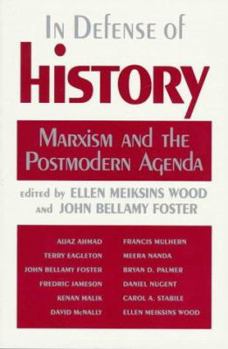In Defense of History: Marxism and the Postmodern Agenda
What is postmodernism? What are the reasons for its attractiveness? In Defense of History is a compelling challenge to postmodern fashion, written by new intellectuals on the left who are reviving historical materialism as an alternative.
Format:Paperback
Language:English
ISBN:0853459835
ISBN13:9780853459835
Release Date:January 1997
Publisher:Monthly Review Press
Length:224 Pages
Weight:0.75 lbs.
Dimensions:0.7" x 6.0" x 9.0"
Customer Reviews
3 ratings
EXCELLENT
Published by Thriftbooks.com User , 15 years ago
This compilation of essays provides a peak down the rabbit hole of Postmodernism. Admitting that I am an Eagleton fan, his essay is a very light and easy read bound by knowledge and thought invoking paragraphs. Would highly recommend!
Take the Sickle and Hammer to the Post-modern Straw Man
Published by Thriftbooks.com User , 22 years ago
Given that the book is a collection of essays, the quality of the content covers a wide spectrum of issues. The overall aim of the book is to give an account of the manner in which postmodernism has hindered social action. Specifically, what is of concern to the philosophers contributing to this work is that the denial of any sort of grand universal meta-narrative by postmodernists denies the ability to form a class of oppressed which can rise up against capitalist oppression. By denyingmeta-history and universals, class struggle, in the eyes of these philosophers becomes impossible. The arguments presented in favor of the particular brand of Marxism held by the contributors, therefore, are of a pragmatic nature and as such do not engage on a theoretical level with the postmodernists. This is one the main problems I have with this book. The contributors only ever look at the practical implication of the postmodern critique without ever engaging the postmodernist on a theoretical level. The postmodern critique of the Marxist meta-narrative is a theoretical one and as such should be argued against not just on a practical level, but also on a theoretical level. A second problem with the book as a whole is that its argument against postmodernism is a straw man. Granted, postmodernism is a philosophical viewpoint that is extremely varied and difficult to define, but the contributors have taken a less developed and easily defeated postmodern perspective as indicative of postmodernism as a whole. What occurs as a result are arguments that do not really engage postmodernism as a whole, but rather engage only a small unsophisticated niche of postmodernism that suits there purposes. It behooves the authors in this book, therefore, to develop a greater understanding of what postmodernism is, and then to develop a critique of it and defense of their own position which does not rest on practicalconcerns alone, but also on the theoretical concerns.
In Defense of Synthesis.....
Published by Thriftbooks.com User , 22 years ago
As a collection of essays this book covers a wide range of topics that are important to a quality understanding about the implications of a Marxist and post-modern critique on contemporary western capitalist society. However, as a dialogue on these topics the book is a little one sided and short legged. The Marxist academics that have contributed to these 14 essays i think do a decent job of articulating much of the problem with post-modernism from a non-post-modern-marxist position. Whether such a read of Marx is particularly coherent with what Marx himself wrote is of another matter. The concern over how one can justify a viable resistance to multinational corporate "free" market capitalism is of the uttermost importance for the authors of the text. The post-modern critique of the Marxist meta-narrative on history (historical materialism) is a kind of line drawn in the sand for most of these academics in that the category of class is justified by such a read of history and class struggle for Marxists is the only coherent and realistic way of engaging in liberatory Praxis given the logic of capitalism. This becomes very important in recent history given the rise of the new social movements (identity politic movements) which have fragmented the old Left categories of class and fragmented agency in the face of class war. Some of the authors of these essays do a better job than others when it comes to articulating the post-modern argument, however, some indeed set up post-modern straw men in order to bring the combine. What appears to be the primary problem here in this debate between Marxists such as these and many post-modern theorists is the failure to see the bridge between the two positions by way of a Coherence epistemological model of justification. As a matter of fact, throughout the entire book words such as knowledge, justification, universal, essential, etc. are all being used seemingly one way by the Marxists and another way by the post-modernist if used at all. The impression one gets from the text on this account is that there are two different language games being played in the debate leading to a whole host of miscommunication. I would recommend this book for reading only if or after one is familiar with the epistemic issues of the debate between post-modernists and Marxists as they rear their heads throughout the entire book.For multicultural Solidarity in class war,M.B.R.






